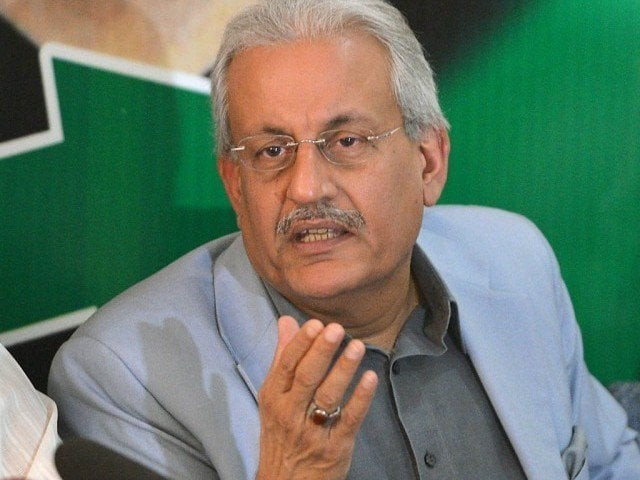Senate session: Rabbani wants details of ‘WB-sponsored bill’
Members claim mysterious forces at work to undermine Parliament

Senate chairman Raza Rabbani. PHOTO: AFP
Having failed to run National Assembly proceedings due to lack of quorum for the third day on Wednesday as a deadlock between treasury and opposition benches persisted over not including the FATA Reforms Bill in the agenda, the government later faced more tough time in the upper house.
Mari Petroleum finds new gas deposits in Sindh
Senate Chairman Raza Rabbani told his secretariat not to place the government business on Orders of the Day for the next two days as punishment for absence of ministers and failure of ministries to submit replies to several questions. After repeated warnings in the past, Rabbani for the first time used his special powers to punish the government. Sub-rule 4 of Rule 13 of the Rules of Procedure and Conduct of Business in the Senate says: “The chairman may initiate, when necessary, such action against those responsible for violating prestige and/or privilege of the House by act of commission or omission including action that may obstruct the working/proceedings of the House.”
As if this was not enough, another issue was awaiting the government as the proceedings progressed. Petroleum Minister Jam Kamal indirectly admitted the World Bank’s role in formulating the Pakistan Petroleum Exploration and Production Regulatory Authority Bill, 2017 which was circulated during a CCI meeting. He was winding up the debate on an adjournment motion moved by Senators Mukhtiar Ahmed Dhamrah and Sassui Palijo regarding attempts to remove petroleum and gas authorities from provincial oversight.
Kamal’s avowal drew a strong reaction from the chairman and opposition members claimed the bill was drafted under the advice of the World Bank. They said a mysterious and unexplained move was afoot to deprive the provinces of their right to develop the upstream petroleum sector by awarding concessions and vest the federal ministry with the power in violation of the Article 172 (3) and other provisions of the Constitution introduced under the 18th Amendment.
During the discussion, PPP Senator Farhatullah Babar said the Pakistan Petroleum Exploration and Production Regulatory Authority Act had already been drawn up to set up an authority to grant and monitor all petroleum concessions and other upstream activities throughout the country. The upstream sector included exploration and production of oil and gas and held the key to sufficiency, decreasing imports and paving way for massive economic development, he said. Because of massive contracts for exploration blocks, the upstream sector is also the most lucrative.
Worse still, the bill provided that until the authority was set up the federal government could by a simple notification entrust the upstream development work anywhere in the country to the petroleum ministry, he said. Thus the proposed bill was just a one-liner that took away the rights of provinces and placed them in the lap of the petroleum ministry, he said. Chairman Rabbani asked him to give a copy of the proposed bill to the secretariat, which he did.
Babar asked why the federal government had neither awarded concession to exploration companies nor allowed the provinces to do so ever since the Petroleum Policy 2012 had been in operation.
“Is it because some powerful lobbies and vested interests are deliberately withholding development of petroleum sector to allow for imports of LNG and other petroleum products?” he asked, demanding that the matter be thoroughly investigated.
He said media reports that the World Bank was behind the move should also be investigated. The bank was not supposed to decide how to apportion economic resources between the provinces and the federation, he said. The senator said the petroleum policy also stated that it would be revisited after five years.
The minister’s acknowledgement of some role of the World Bank drew the ire of the chairman. “Are we bartering our sovereignty? Who is the World Bank to make policies on oil and gas reserves? I take strong exception to the World Bank sitting on top and making procedures and laws relating to Pakistan’s natural resources,” Rabbani remarked.
Pakistan gives go-ahead for oil, gas import from Nigeria
He asked Kamal to submit in writing by Friday how much and at what level the World Bank had played a role in the legislation and which representatives of the international lender were involved in its drafting.
Later, members from various parties, including some from ruling PML-N, spoke on how an attempt for across-the-board accountability was thwarted allegedly by some invisible forces. On their admission that their own parties had backtracked from including the judiciary and armed forces in the ambit of the proposed law to set up the National Accountability Commission and how Parliament was being undermined by these parties themselves, Rabbani remarked, “We will all be destroyed by the pen of historians.”
The Senate will take up on Thursday a controversial agreement the government inked with a religious group to end its three-week-long sit-in at a most important intersection of the federal capital.



















COMMENTS
Comments are moderated and generally will be posted if they are on-topic and not abusive.
For more information, please see our Comments FAQ